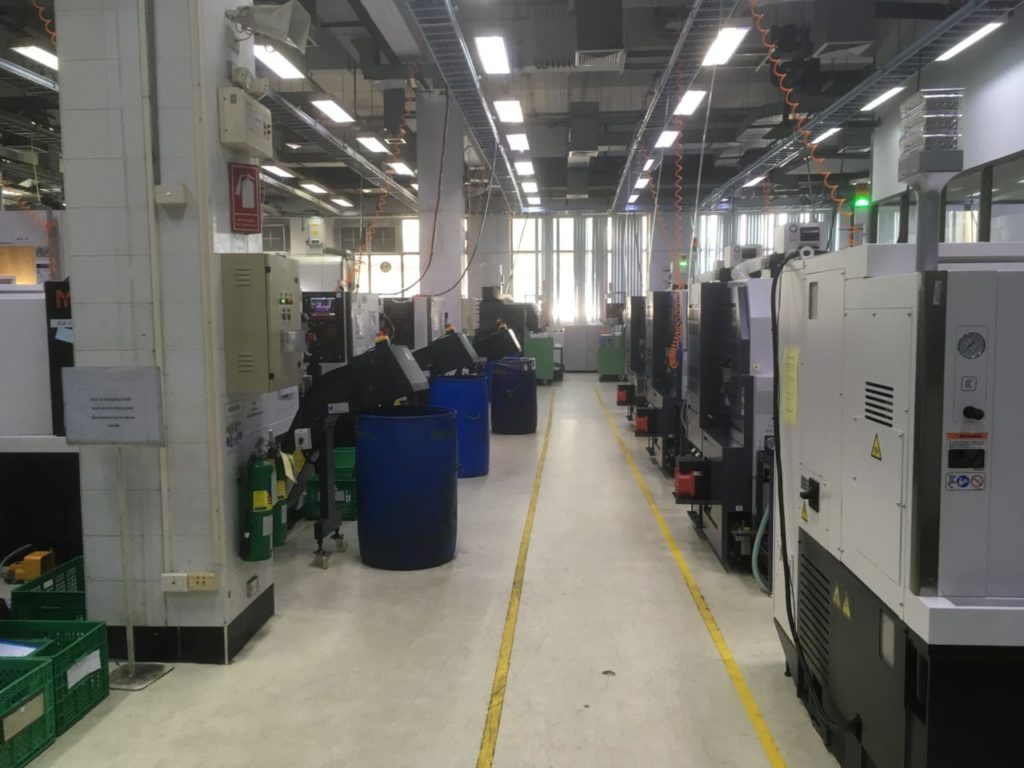
The factory floor at CCS Advance Tech in Bangkok, Thailand.
BANGKOK, THAILAND — In March of this year, CCS Advance Tech became the first domestically-owned company in Thailand to become a Boeing-approved component supplier, completing the company’s audit in three special processes critical to aerospace manufacturing: chromic acid anodizing, fluorescent penetrant inspection and magnetic particle inspection.
It was a proud moment for the relatively small Thai manufacturing company, but far from the first “first” achieved by CCS.
In 2005, CCS was the first Thai-owned company granted AS9100 certification, marking global quality standards for aerospace manufacturing.
In 2009, the company received accreditations from the National Aerospace and Defense Contractors Accreditation Program (NADCAP) in a number of aerospace manufacturing special processes.
And in 2014, CCS was the first Thai-owned company to win an aerospace contract worth more than $50 million, supplying parts and assemblies for the Boeing 777 and 787; Airbus A320, A350, A380 and A220; and the AW139 medium twin.
Between 2012 and 2016, the company’s aerospace division grew in revenue by 400 percent. CEO Ketan Pole expects to post at least 200 percent growth between 2016 and 2021.
Pole says there are a lot of new opportunities in aerospace manufacturing coming to Thailand, as a “best-cost” country.
Founded in 1989 with “one man and one machine,” CCS Group, which also includes CCS Engineering and CCS Packaging, has grown to employ over 1,400 people, with 450 in aerospace. As a build-to-print manufacturer willing to take on projects of any size, CCS produces parts used in electronics, computers, automotive, biomedical and many other industries.
But aerospace is what Pole is most focused on. In 2005, the company entered the aerospace sector with just two machines. Today, it has 110, with plans and space allocated to buy plenty more. CCS contributes parts to nacelles, interiors, actuation, cargo, barking, sensing, and air management systems for aircraft.
“I see the biggest growth from aerospace components. No growth is in automotive,” said Pole during a tour offered to media. “And a little growth in oil & gas.”

CCS supplies parts to many Tier 1 suppliers such as Collins Aerospace, Moog Aircraft Group and Triumph — all of which Pole describes as eager to give his company more business. For certain parts that require advanced manufacturing techniques, it’s the sole supplier companies like Collins have outside the United States. CCS isn’t yet involved in defense supply chains but has received interest from BAE Systems in the UK, according to Pole.
Part of the company’s success stems from a focus on advanced technology and processes; instead of competing with other regional manufacturers, CCS seeks to bid for parts where it’s one of the only certified producers in the region. Pole explained using seating bars for aircraft seats as an example.
“We also do seating bars for the pilot and crew seats. The most simple seat is the economy seat. So we don’t do economy seats,” Pole said.
CCS’ success also comes from a strategic and relentless focus on exceeding customer expectations. As Rotor & Wing toured the factory floor, Pole pointed to a nearby supplier contract on a bulletin board.
“The company is looking for less than 500 [parts per million] defective,” Pole explained. “In the last six months, we are zero. On-time delivery, they are looking for 95 percent. We are 100.”

“No one else in Thailand is making this part,” said CEO Pole. It’s used in air management systems for aircraft. Photo: Brian Garrett-Glaser
CCS also benefits from a booming Asian aerospace industry. Pointing to a particular machine on the factory floor, Pole said the lead time for a company to acquire it in the U.S. or EU would be five or six months.
“Here? Seven days,” Pole said, because regional suppliers of the machine keep more stock than their Western equivalents — something they are able to do because of the booming industry.
Looking ahead, Pole described plans to continue moving his company toward high-tech manufacturing through IoT connectivity and the certification of more special processes. He also has plans for CCS’ next “first” as a Thai-owned company.
“Landing gear is very sensitive to weather; you have to land in -40 degrees and +40 degrees weather, so the landing gear cannot rust,” Pole explained. “But landing gear coating is done with cadmium plating, and cadmium plating is dangerous and poisonous. So, companies have developed a new coating called zinc-nickel plating that is less harmful than cadmium plating, and all future aircraft with have this.”
“And there is nobody who can do zinc-nickel plating in Thailand. So we want to be the first Thai company to do this.”